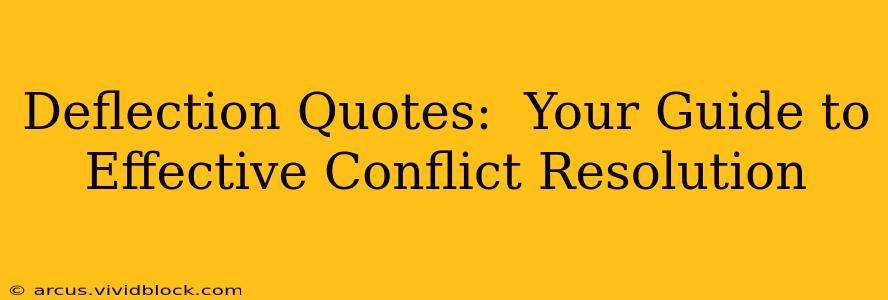Conflict is inevitable in life, whether it's a disagreement with a colleague, a misunderstanding with a loved one, or a challenging interaction with a stranger. Knowing how to navigate these situations gracefully and effectively is a crucial life skill. While direct confrontation can sometimes be necessary, the art of deflection—redirecting the conversation or de-escalating tension—can be a powerful tool for conflict resolution. This guide explores the power of deflection quotes and how they can help you navigate challenging conversations.
What is Deflection in Conflict Resolution?
Deflection, in the context of conflict resolution, isn't about avoiding the issue entirely. Instead, it's about strategically shifting the focus to a more productive or less emotionally charged area. This might involve acknowledging the other person's feelings, rephrasing their statement, or introducing a new perspective. The goal is to diffuse the tension and create space for a more constructive dialogue. It’s a valuable technique to keep a conversation from spiraling into an unproductive argument.
Effective Deflection Quotes and Phrases
The right words can make all the difference in de-escalating a conflict. Here are some examples of deflection quotes and phrases that can be adapted to various situations:
-
"I understand your frustration, and I want to address your concerns. Perhaps we can approach this from a different angle..." This acknowledges the other person's feelings while suggesting a more collaborative approach.
-
"I hear what you're saying, and I appreciate your perspective. Let's focus on finding a solution that works for both of us." This validates the other person's point of view while shifting the focus to a collaborative solution.
-
"That's a valid point, and I'll give that some thought. But right now, I'd like to focus on [specific task/goal]." This acknowledges the validity of the other person's concern while gently redirecting the conversation to a more pressing matter.
-
"I can see you're upset, and I want to understand your feelings better. Can you tell me more about what's bothering you?" This encourages the other person to express themselves further, but in a controlled and understanding manner, preventing an escalation.
How to Use Deflection Quotes Effectively
While deflection quotes can be highly effective, their success depends on delivery and context. Here are some key considerations:
-
Timing: Choose the right moment. Don't deflect when a direct response is necessary or when ignoring a legitimate concern would be harmful.
-
Tone: Maintain a calm and respectful tone of voice. A defensive or dismissive tone will likely escalate the situation.
-
Authenticity: Be genuine in your response. Avoid using deflection quotes as a manipulative tactic; they should be used to facilitate constructive communication.
-
Follow-up: After deflecting, make sure to follow up and address the original concern at an appropriate time. Ignoring the underlying issue entirely will likely lead to future conflicts.
When Deflection Might Not Be Appropriate
Deflection is a useful tool, but it's not always the best approach. There are situations where direct confrontation is necessary, such as addressing serious misconduct or resolving significant disagreements.
What are some alternative conflict resolution strategies?
There are many other conflict resolution techniques beyond deflection. These include:
-
Active listening: Giving the other person your full attention and demonstrating that you understand their perspective.
-
Compromise: Finding a mutually acceptable solution that satisfies both parties' needs.
-
Mediation: Involving a neutral third party to help facilitate communication and find a resolution.
-
Negotiation: Working together to find a solution that meets the needs of everyone involved.
Can deflection quotes be used in professional settings?
Yes, deflection quotes can be extremely valuable in professional settings. They can help maintain composure during difficult meetings, diffuse tense situations, and navigate disagreements with colleagues or clients.
Are deflection quotes manipulative?
No, deflection quotes aren't inherently manipulative. However, they can be used in a manipulative way if not employed with sincerity and genuine intent. The goal is to de-escalate tension and create an environment conducive to healthy communication, not to avoid responsibility or control the narrative.
How can I improve my conflict resolution skills?
Improving your conflict resolution skills requires practice and self-awareness. This involves actively listening, practicing empathy, and learning to manage your own emotions effectively. Consider taking a conflict resolution workshop or seeking guidance from a professional coach.
By mastering the art of deflection and integrating other conflict resolution techniques, you can navigate challenging conversations with grace and effectively resolve conflicts in your personal and professional life. Remember, effective communication is key to peaceful and productive relationships.

